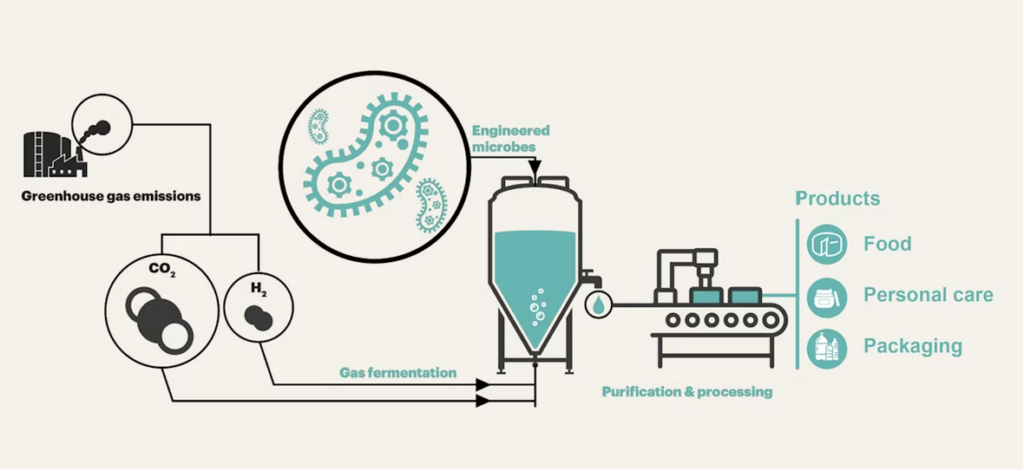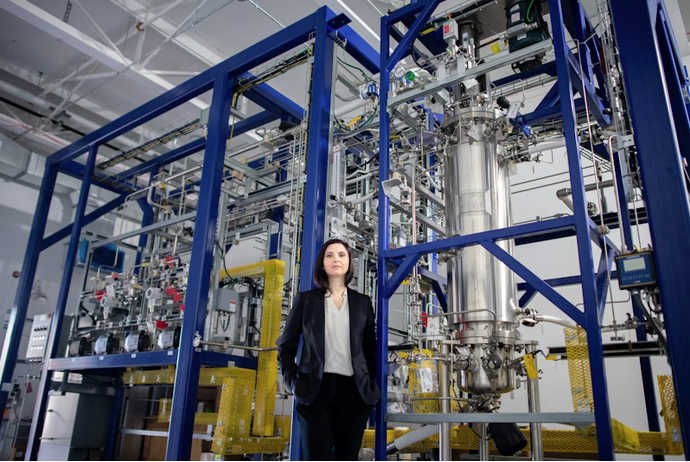
The Wyss Institute for Biologically Inspired Engineering at Harvard University announced today that Circe, a startup developed at the Institute and spun out of Harvard, has signed a worldwide, exclusive licensing agreement coordinated by Harvard’s Office of Technology Development (OTD) to commercialize a novel bioproduction technology that could significantly reduce the carbon emissions of industries from food to aviation fuel.
Circe has raised more than $8 million to date from investors including Regen Ventures, Undeterred Capital, Ponderosa Ventures, Bee Partners, and Elementum Ventures.
“One of the great challenges humanity faces is how to maintain global growth and production and decarbonize everything at the same time. Circe is addressing this critical problem by using gas fermentation to manufacture the products and molecules we need in a carbon-negative way,” said Shannon Nangle, Ph.D., who co-founded Circe along with fellow Wyss member Marika Ziesack, Ph.D.
Developed in the lab of Wyss Core Faculty member Pamela Silver, Ph.D., Circe’s technology grows microbes on gasses like carbon dioxide — in the same way plants grow — and harvests the molecules they build. Nangle and Ziesack used synthetic biology to tweak the metabolisms of certain microbes that naturally “eat” greenhouse gasses so that they use those gases to manufacture molecules that are valuable to many industries. Their platform has produced molecules identical to those that make up sugars, fats, biodegradable plastics, and biofuels, all using only CO2, water, and electricity as inputs.
“In order to ensure that the Earth is habitable for future generations of humans, we urgently need to decarbonize industries and start reversing the damage we’ve caused to the planet. Microbes are wonderful living machines that we can leverage to produce the things we need for everyone to live a happy, comfortable life while reducing pollution, land use, and fossil fuel consumption,” said Silver, who is also the Elliot T. and Onie H. Adams Professor of Biochemistry and Systems Biology at Harvard Medical School (HMS).

Circe’s first products in development are triglycerides: the molecules that make up the fats, butters, and oils that we eat and use every day. The team has used their triglycerides to make the world’s first gas fermentation-derived chocolate, which – given the worldwide shortage of cocoa in the 2023-2024 growing season – could provide a solution to global food supply chain interruptions. In addition, this proof-of-concept enables the production of food products in any region, reducing the industry’s carbon footprint.
The Circe team is also exploring other types of fats, including milkfat that can add creaminess to both dairy and non-dairy milk products, and palm oil that can be used across the food and cosmetics industries, as well as for sustainable fuels.
Circe’s fermentation platform was created and significantly de-risked at the Wyss Institute through the Institute’s validation pipeline, which provides aspiring entrepreneurs with the resources and support they need to transition their teams and technologies from the lab to the real world. Based on its potential for significant positive impact, it was named an Institute Project in 2021 and provided additional support from the Wyss to expedite its commercialization.

Over the course of Circe’s development, the team won several accolades in recognition of its innovative concept. While at the Wyss, they were awarded $3.2 million from the US Department of Energy’s ARPA-E ECOSynBio program, and Nangle and Ziesack were named 2021 Activate Fellows. After the company spun out of Harvard, Nangle was named an “Innovator Under 35” by MIT Technology Review.
“For centuries, humans’ relationship with Nature has been dominated by extraction, destruction, and consumption. A paradigm shift to one of conservation, regeneration, and co-production using Nature’s building materials rather than harsh chemicals is starting to happen, but at much too slow a pace. The Circe team’s technology has the potential to speed up the transition to a future in which we work with Nature to produce what we need, rather than exploiting it,” said Don Ingber, M.D., Ph.D., the Wyss Institute’s Founding Director.
Ingber is also the Judah Folkman Professor of Vascular Biology at HMS and Boston Children’s Hospital, and the Hansjörg Wyss Professor of Bioinspired Engineering at Harvard’s John A. Paulson School of Engineering and Applied Sciences (SEAS).
About The Wyss Institute for Biologically Inspired Engineering at Harvard University
The Wyss Institute for Biologically Inspired Engineering at Harvard University is a research and development engine for disruptive innovation powered by biologically-inspired engineering with visionary people at its heart. Our mission is to transform healthcare and the environment by developing ground-breaking technologies that emulate the way Nature builds and accelerate their translation into commercial products through formation of startups and corporate partnerships to bring about positive near-term impact in the world. We accomplish this by breaking down the traditional silos of academia and barriers with industry, enabling our world-leading faculty to collaborate creatively across our focus areas of diagnostics, therapeutics, medtech, and sustainability. Our consortium partners encompass the leading academic institutions and hospitals in the Boston area and throughout the world, including Harvard’s Schools of Medicine, Engineering, Arts & Sciences and Design, Beth Israel Deaconess Medical Center, Brigham and Women’s Hospital, Boston Children’s Hospital, Dana–Farber Cancer Institute, Massachusetts General Hospital, the University of Massachusetts Medical School, Spaulding Rehabilitation Hospital, Boston University, Tufts University, Charité – Universitätsmedizin Berlin, University of Zürich, and Massachusetts Institute of Technology.
About the Harvard University’s Office of Technology Development
Harvard University’s Office of Technology Development (OTD) promotes the public good by fostering innovation and translating new inventions made at Harvard University into useful products that are available and beneficial to society. Our integrated approach to technology development comprises sponsored research and corporate alliances, intellectual property management, and technology commercialization through venture creation and licensing. More than 100 startups have launched to commercialize Harvard technologies in the past 5 years. To further bridge the academic-industry development gap, Harvard OTD manages the Blavatnik Biomedical Accelerator and jointly oversees the Harvard Grid and the Climate and Sustainability Translational Fund.
Author
Lindsay Brownell
Source
Wyss Institute, press release, 2024-05-15.
Supplier
Circe Bioscience
Wyss Institute at Harvard
Share
Renewable Carbon News – Daily Newsletter
Subscribe to our daily email newsletter – the world's leading newsletter on renewable materials and chemicals











